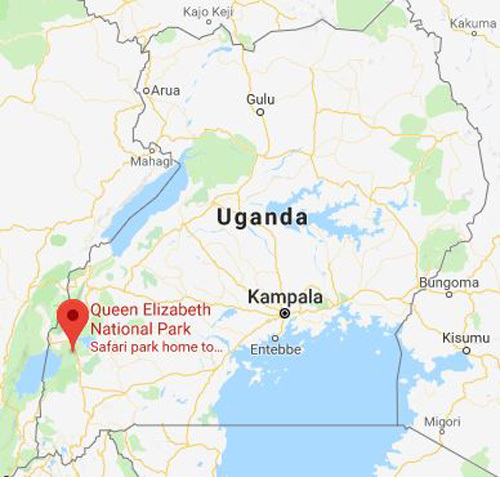Govt launches hunt for lions' killers
“It is suspected that the lions were intentionally fed on poisoned meat,” said Prof. Ephraim Kamuntu, adding that the ministry was deeply saddened and regrets the sad incident.
The Government has launched a hunt for the killers of the eleven lions that were found dead in Queen Elizabeth National Park in Kasese district.
Queen Elizabeth National Park is one of the biggest homes of Uganda's most attractive fauna and flora.
The Uganda Wildlife Authority (UWA) spokesperson, Simplicius Gessa, revealed Thursday that the lions had been found dead around Hamukungu fish landing village, an enclave in the park.
In a statement issued yesterday, the Minister of Tourism Wildlife and Antiquities, Prof. Ephraim Kamuntu, said the dead pride of lions consisted of 3 adult lionesses and 8 cubs, whose carcasses were found on Wednesday about 100 metres from Hamukungu fishing village in Kasese district.
"It is suspected that the lions were intentionally fed on poisoned meat," said Prof. Ephraim Kamuntu, adding that the ministry was deeply saddened and regrets the sad incident.
Kamuntu assures tourists
Kamuntu said the ministry has "already reported this matter to the Police and we are working closely with other relevant authorities and stakeholders to pursue this matter until the perpetrators of this heinous act are brought to book and face the full extent of the law."
He assured the public that the ministry will continue to execute her mandate of protecting and conserving Uganda's wildlife resources.
He assured visitors that Uganda's National parks are safe for visitors with all the attractions therein that we are naturally gifted with as a country.
"The loss of the pride does not mean that we have lost all the lions; we have more lions including tree climbing lions in Ishasha.
"We shall continue to strengthen the protection of lions and other wildlife life through other innovations including coming up with appropriate interventions in human wildlife conflict management," said the minister.
The death of the lions comes after Uganda celebrated the World Wildlife Day on March 3rd in Kasese district with a theme that focused on creating a safe environment for the survival of the big cats.

President's warning
During the celebration, President Yoweri Museveni, in a speech read for him by Prime Minister Dr. Ruhakana Rugunda, sternly warned poachers and pastoralists against poisoning the lions, classified among the big cats.
Comparing the poachers with terrorists, Museveni warned that government would deal with them the way it had dealt with other terrorists, including the Allied Democratic Front (ADF) that was based in the Rwenzori sub-region and the Lord's Resistance Army (LRA) rebels.
"The poachers must know that we have defeated terrorism and we are now coming for them," Museveni said in the written speech.
"I have also heard that our lions are being poisoned by the pastoralists. This must stop," the President further warned.
The day was marked under the global theme "The Big Cats" and the national one, "Creating a safe environment for the survival of Uganda's big cats".
Speaking at the celebrations, the UN Resident Coordinator, Rosa Malango, said although the lion, the cheetah, the leopard are some of the world's most celebrated cats, they are facing very serious threats mostly from humans, climate change and the loss of biodiversity.
During the celebrations, all district and national leaders committed themselves to supporting the protection of the big cats.
According to Prof. Kamuntu, this is not the first time such an incidence has happened as a result of human wildlife conflict.
"We lost another pride of 9 lions in 2007 suspected to have been poisoned by the herdsmen illegally using the park as a grazing ground," he says.
Loss to government, communities
According to the Minister, the killing of lions impacts heavily on tourism and revenue generation as most of the tourists who come to the savannah parks of Uganda are more interested in lion activities.
Tourism revenue is playing a critical role in livelihoods and development of communities around the national parks.
Through UWA, government gives back 20% of the Authority's annual park gate collections to the communities neighboring the park under the revenue sharing scheme.
"Last year, we gave sh929,269,487 to districts neighbouring Queen Elizabeth National Park of which sh362,044,141 went to Kasese district to enhance the livelihoods of communities surrounding the protected area," Kamuntu said.
Funds given to districts under the revenue sharing scheme go to community income generating projects and social service infrastructure such as schools and health facilities.
The revenue sharing scheme is meant to strengthen partnerships between local communities, local governments and management of wildlife areas leading to sustainable management of wildlife resources in protected areas.
He added that apart from revenue, there are other collaborative initiatives where communities benefit directly from the National Park. These include resource access such as fuel wood, grass, water, fish, bee keeping etc. Such resource off take from the park is valued at over sh400m per annum, the minister further said.
"It is therefore unfortunate that such an economically vibrant resource is maliciously being exterminated by selfish Individuals that are negative towards the development of the communities and the country at large."
Condemnation
"We condemn in the strongest terms possible such an act of deliberately killing animals which are now a top foreign exchange earner to the country contributing 10% of GDP and 23% of the total foreign exports. "
He said nature tourism is currently contributing $1.4b to the economy and also contributes to the well-being of communities surrounding the national parks."
"We have already reported this matter to the police and we are working closely with other relevant authorities and stakeholders to pursue this matter until the perpetrators of this heinous act are brought to book and face the full extent of the law.